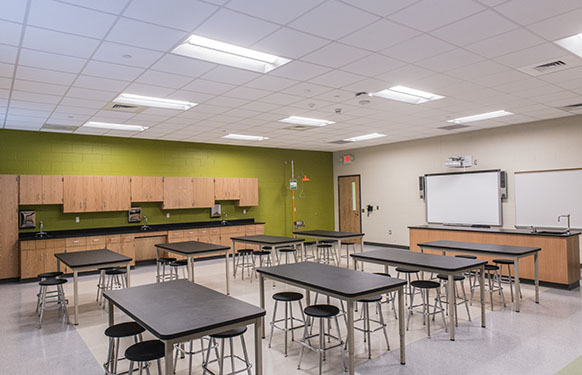
Opportunity
At Sandy Grove Middle School in Lumber Bridge, North Carolina, students not only get an education in the Science, Technology, Engineering and Math subjects at this STEM school. They also attend classes in their very own environmental laboratory and learn first-hand the benefits of a new concept in sustainability for educational institutions — a net-positive school building that produces more energy than it consumes. The school even has a working energy dashboard that tracks the performance of the facility’s green elements, enabling teachers to use the building itself as a teaching tool.
Developed by Firstfloor and sister company SfL+a Architects, Sandy Grove is a public/private partnership and the first energy positive school in the nation to be financed out of its own expected energy savings and then leased to the school system. The building, designed for LEED-platinum certification, is projected to save the county $16 million on its energy bills over the life of the building.
As Dr. Freddie Williamson, Superintendent of Hoke County Schools, states: "Being from a high-growth, low-wealth county, it was critical for Hoke County Schools to approach the construction process of our newest school in a way that would be speedy, efficient and cost-effective." The Sandy Grove project was designed for maximum energy efficiency with one of the key components being the use of high-efficiency LED lighting. However, LED wasn’t the initial vision for the lighting solution. As Barry Buckman, Principal with SfL+a, explains, “The project was originally designed around traditional fluorescents.” But a chance introduction to Cree — one of the industry leaders in LED lighting technology — led SfL+a down a path they’re now following with all other projects.
Solution
Sandy Grove was already under construction when SfL+a opted to explore Cree® LED lighting. “LED was just emerging in the market but we didn’t think it was viable from a cost standpoint," says Buckman. "Energy savings is important and Cree did a really good job of taking our lighting design and doing an energy analysis with Cree® fixtures to show what the savings can be.”
Cree LED lighting turned out to be the ideal solution for the Sandy Grove project. Buckman explains, “It’s about how much energy you can conserve so you don’t have to generate as much to offset what you’re using. LED is an important aspect in that it’s just a very energy-efficient light fixture, so you’re using less power to handle what your typical lighting loads are going to be. We get to conserve some of that energy right off the bat.”
Buckman adds, “Now, moving forward, we’re using LED lighting as the standard of design. The next couple of schools we’re working on actually have 100 percent LED, allowing us to maximize that conservation aspect of
Benefits
Over 80 percent of the Sandy Grove fixtures are LED. The Cree® lighting solution includes LR Series LED downlights, the CR Series of architectural LED troffers and LEDway® street lights. The interior lights are powered by Cree TrueWhite® Technology, offering an exclusive combination of industry-leading efficacy, exceptional light quality and consistent color temperatures, creating a noticeably better visual learning environment that helps improve clarity, reduce fatigue and improve the sense of security. Buckman confirms, "Experiencing the building, when you walk through the building, you can certainly get a nice sense of the quality of light."
Because Cree LED lighting is covered by industry-leading 10-year limited warranties and doesn’t have to be relamped like other solutions, replacing traditional fluorescent fixtures with efficient Cree LED lighting allowed Sandy Grove to save on their maintenance expenses as well. According to Buckman, “Maintenance is always a key item for schools. There’s durability savings that are important when you look at lifecycle costs. Also, the ability to put lighting up high is something we wouldn’t have considered before from a maintenance and access standpoint — too much kickback from the maintenance department. But because it’s an LED light, you can overcome those fears of accessibility. From an architect’s perspective, with the attributes of Cree® LED lighting, on some upcoming projects we did put more drama back into the space. LED lighting offers you more design leeway and it certainly does offer a lot of maintenance savings.”
As Buckman explains, “Another benefit to Cree® LED lighting is the fact that the fixtures don’t heat the space. This has benefits for (HVAC) mechanical sizing and heat load, making LED attractive beyond just the initial energy usage benefit.”
“The controllability offered by the Cree® fixtures is another nice feature we picked up on,” says Buckman. “Especially when you start thinking about building energy use after occupancy — putting controls in place to step back the lighting when the building goes into less occupied or unoccupied modes. The dimming capabilities are actually pretty phenomenal too. Site lighting can drop down to a 40 percent lighting level using the same fixtures, but it’s using less energy.”
Buckman sums it up, "On a recent visit, one little girl jumped up and started going through the energy dashboard, actually pulling up all the different usages. It was a really exciting, powerful moment to see the kids actively breaking the information down in a way that showed they understood it. It’s a great teaching tool — a way of making these technologies and the reasons behind them accessible to a lot of different age groups.” A great lesson plan, well taught.





